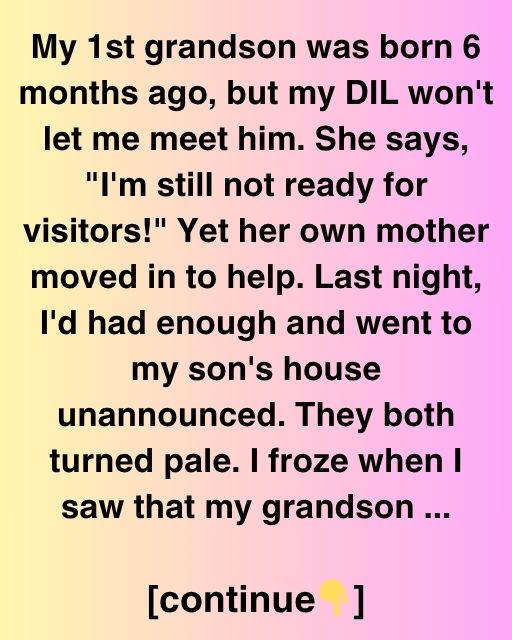I’d been waiting six long months to meet my first grandchild, but every time I offered help—even something as simple as a video call—my daughter-in-law gently shut me out. “I’m just not ready for visitors,” she’d say, while her own mother moved in and out of the baby’s nursery as if she owned the place. My son, too, grew distant, answering my calls with strained, “Give us more time, Mom,” before hanging up. My heart ached; six months felt like an eternity.
One evening, unable to bear it any longer, I baked a batch of cinnamon rolls, wrapped them warmly in a towel, and drove to their doorstep. When my son cracked the door, fear flickered across his face. My daughter-in-law hovered behind him, arms folded and wary. I stepped inside before they could protest—and froze. In the dim living room, not one swaddled infant, but two identical babies lay sleeping in a playpen. My head spun: twins? Why didn’t they tell me?
Tears sprung to my eyes as my daughter-in-law explained, her voice trembling: she’d given birth prematurely, nearly lost her life, and watched one baby fight for weeks in the NICU. Overwhelmed by fear and postpartum anxiety, she’d retreated, too scared to face questions, too protective to share their struggle. My son, guilt etched on his face, added, “We thought we were sparing you the worry.” But standing there, watching the twins stir and coo, I realized silence had only bred more pain.
Gently, I knelt beside the playpen and spoke to them in a soft voice, offering my finger to one curious infant. Their tiny hands grasped it, and something in me shifted. “You could have told me,” I whispered, but there was no anger—only relief. She admitted she’d felt like a failure for needing help. I pulled her into a hug. “Needing help doesn’t make you a bad mother,” I said. “It makes you human.”
That night, I offered to stay so she could rest. She hesitated, then agreed. Mornings I arrived early to feed bottles and change diapers, while she watched from the doorway, gathering the courage to emerge. Over coffee, she began to share small triumphs: one baby’s first giggle, the other’s insistence on kicking like a tiny frog. Trust grew between us with each shared smile.
When an emergency pulled her away one morning, she begged, “Can you watch them?” I nodded, cradling both babies and singing lullabies I once sang to their father. When she returned, relief and gratitude shone in her eyes. “I don’t know what we’d do without you,” she murmured.
Weeks later, sensing tension in my son and daughter-in-law as they juggled work and parenting, I reminded them of a lesson from my own marriage: set aside ten minutes each day to talk—no phones, no distractions. They took my advice, and the house soon buzzed with laughter again.
Then came the day she surprised me with a question I never expected: “Would you move in with us for a while? You’re the heart of this home.” I agreed, and we rearranged the guest room into my new bedroom. I watched their first steps, first words, and held them through late-night cries. I was no longer the outsider—I was part of their life.
At the twins’ first birthday, my daughter-in-law raised her glass. “To the grandmother who never gave up on us—thank you for your patience, your forgiveness, and for loving our boys with your whole heart.” Tears blurred my vision as I realized how close I’d come to letting bitterness keep me outside. But love, I learned, is persistent. If you keep showing up—quietly, steadfastly—closed doors can swing wide open, and behind them may be more love than you ever imagined.
